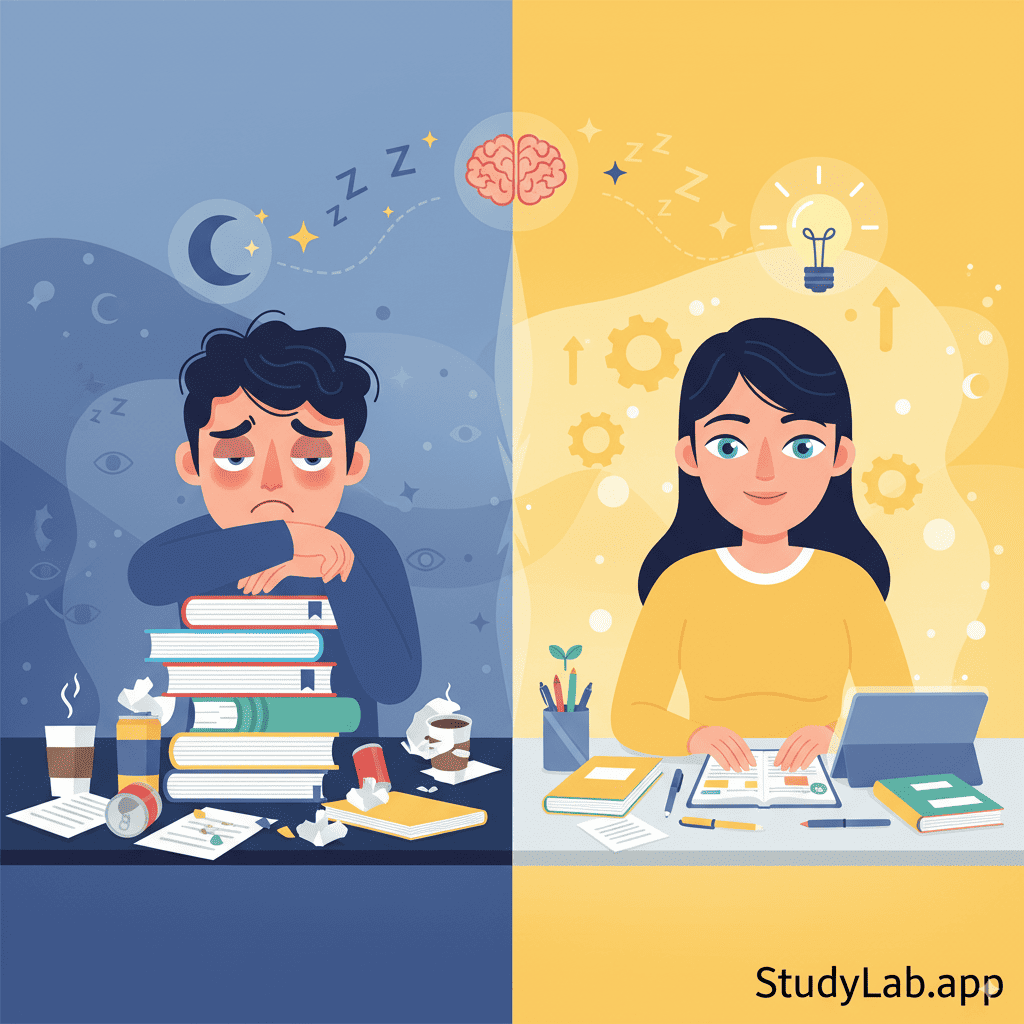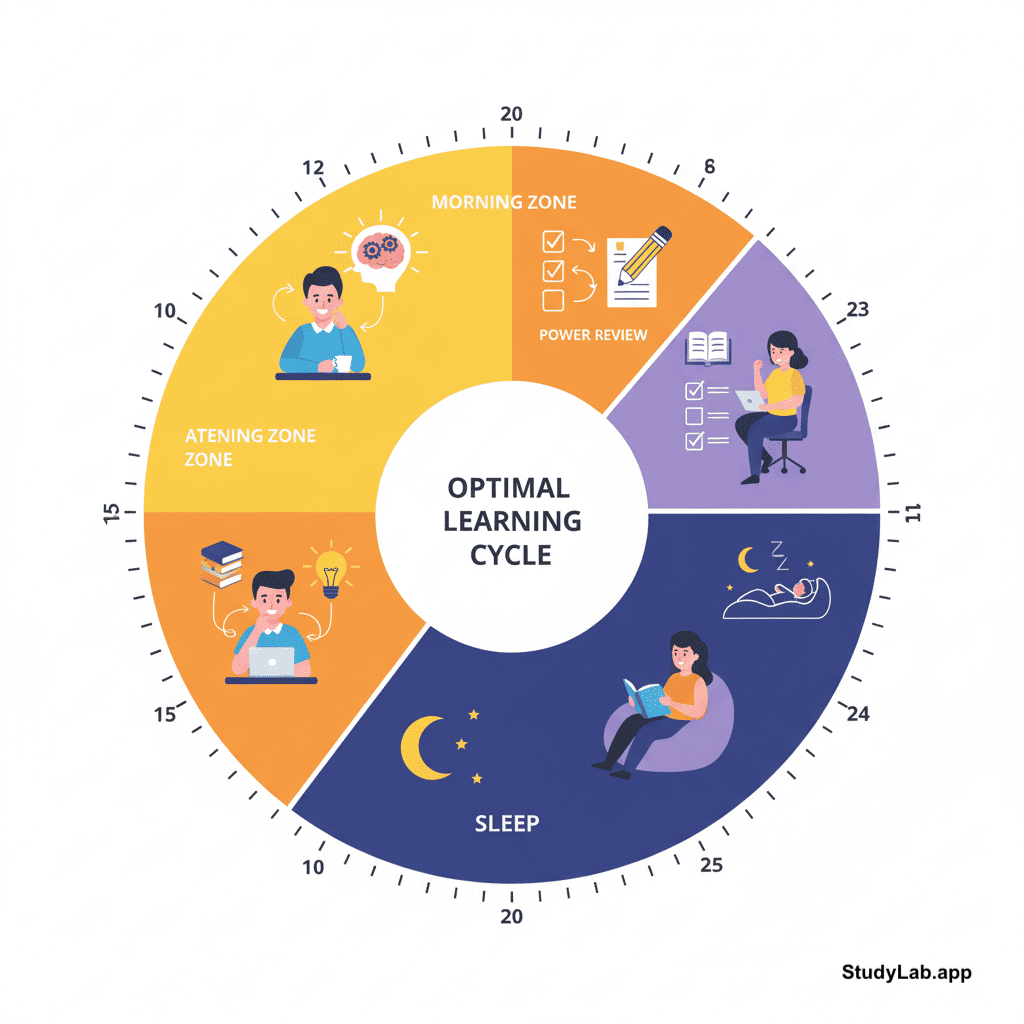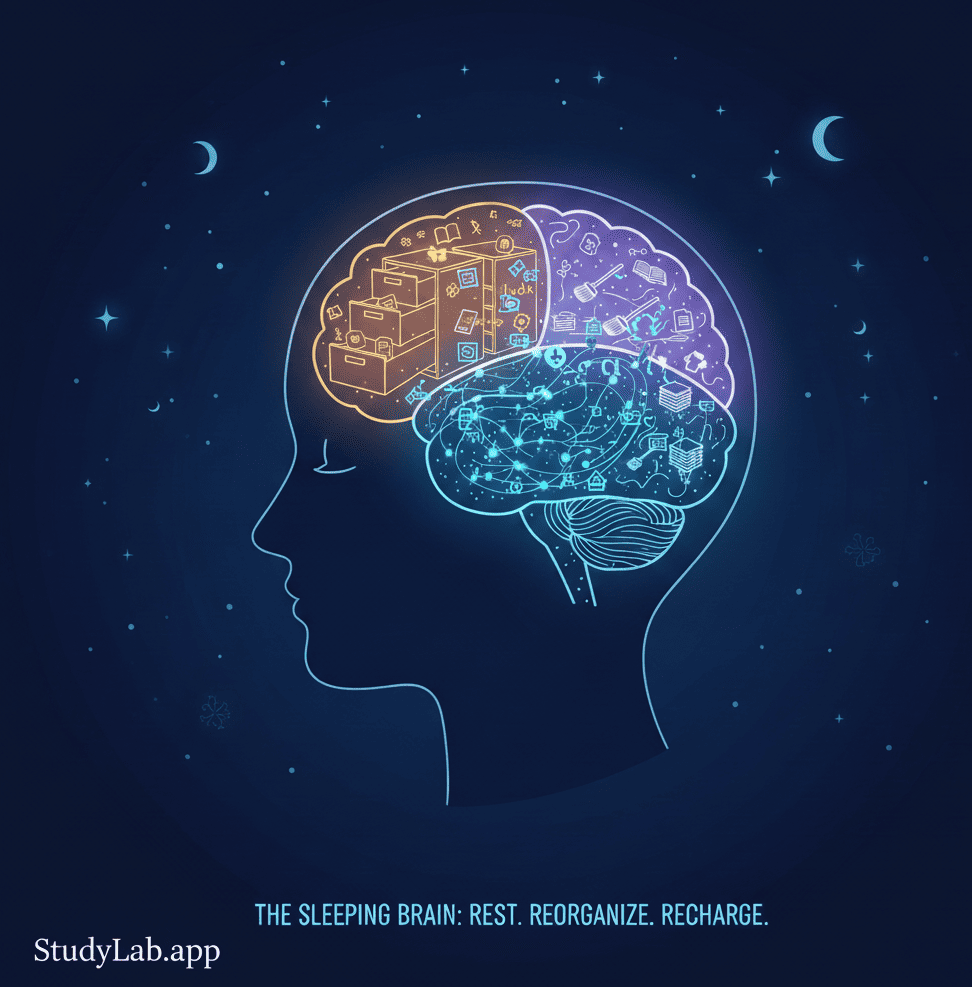Why Sleep Is Your Secret Weapon for Academic Success (And Why All-Nighters Are Sabotaging Your Grades)
Discover how sleep transforms learning and memory for students. Science-backed strategies to boost academic performance through better rest habits.

Picture this: It's 2 AM, you're three energy drinks deep, and you're trying to memorize chemistry formulas that might as well be written in ancient hieroglyphics. Sound familiar? If you're nodding your head (and fighting to keep your eyes open), you're not alone. Millions of students worldwide face the same brutal choice every night: sleep or study?
Here's the plot twist that might change everything: choosing sleep isn't giving up on your academic success—it's the key to unlocking it.
The relationship between sleep and learning isn't just some feel-good wellness advice. It's backed by decades of neuroscience research that reveals something remarkable: your brain doesn't just rest when you sleep. It actively transforms everything you studied into long-term memories, clears out mental clutter, and prepares you for peak performance the next day.
How Does Sleep Affect Memory? The Science Behind Your Brain's Nightly Upgrade
When you sleep, your brain essentially runs a sophisticated filing system that would make any librarian jealous. During different sleep stages, your neurons replay the day's learning experiences, strengthening the connections that form memories and discarding information your brain deems unnecessary.
Sleep and memory consolidation work through three key processes:
Encoding Enhancement: During slow-wave sleep (the deep sleep phase), your brain strengthens the neural pathways created during learning. Think of it like turning a rough pencil sketch into a permanent ink drawing.
Memory Integration: REM sleep helps connect new information with existing knowledge, creating those "aha!" moments where concepts suddenly click together. This is why you might go to bed struggling with a math problem and wake up knowing exactly how to solve it.
Selective Forgetting: Your brain also decides what to forget, clearing out irrelevant details to make room for important information. This isn't a bug—it's a feature that helps you focus on what matters most.
Recent research from Harvard Medical School found that students who got adequate sleep after learning new material performed 40% better on recall tests compared to those who stayed awake. Even more impressive? Students who slept well consistently throughout a semester showed significant improvements in problem-solving abilities and creative thinking.
What Happens When Students Don't Get Enough Sleep?
Let's be honest about what sleep deprivation really costs you academically. When you consistently get less than 7-9 hours of sleep, you're not just tired—you're operating with significant cognitive handicaps.
Your focus becomes scattered. Sleep-deprived students show attention spans similar to those with ADHD, making it nearly impossible to concentrate during lectures or while reading complex material.
Your working memory shrinks. This is your brain's ability to hold and manipulate information in real-time. When compromised, you'll find yourself reading the same paragraph multiple times or forgetting instructions mid-task.
Your emotional regulation fails. Ever noticed how everything feels more stressful when you're exhausted? Sleep deprivation amplifies anxiety and makes it harder to cope with academic pressure.
Your immune system weakens. Missing classes due to illness becomes more likely, creating a snowball effect on your academic performance.
When did you last feel truly rested before an exam? If you can't remember, you might be unknowingly sabotaging your academic potential.
The most dangerous part? Many students don't realize how impaired they are. Just like drunk drivers who think they're fine to drive, sleep-deprived students often overestimate their cognitive abilities while their performance quietly suffers.
The Real Cost of All-Nighters: Why Cramming Backfires
Here's what actually happens during an all-nighter: You might feel like you're absorbing information, but without sleep to consolidate those memories, most of what you "learned" vanishes within 24-48 hours. You're essentially pouring water into a bucket with holes in the bottom.
Studies consistently show that students who pull all-nighters:
- Score lower on exams than those who studied less but slept well
- Make more careless errors due to impaired attention
- Experience worse performance on subsequent exams, not just the immediate one
- Take longer to recover their normal cognitive function
Better strategy: Study efficiently, then sleep. Your brain will do the heavy lifting of memory consolidation while you rest.
How to Optimize Study Timing Around Sleep Cycles for Maximum Retention
Your brain isn't equally receptive to learning throughout the day. Understanding your natural rhythms can dramatically improve your study efficiency.
Morning (7 AM - 11 AM): Peak alertness makes this ideal for tackling your most challenging subjects. Your prefrontal cortex—responsible for complex reasoning—functions best during these hours.
Early Afternoon (1 PM - 3 PM): Good for review and practice problems. While not peak alertness, your brain can still handle moderate cognitive demands effectively.
Evening (6 PM - 9 PM): Perfect for review and light studying. This timing allows enough space before sleep for your brain to begin processing the information.
The Golden Rule: Stop studying at least one hour before your target bedtime. Late-night cramming not only reduces sleep quality but also interferes with memory consolidation.
Subject-Specific Impact: How Poor Sleep Affects Different Academic Areas
Mathematics and Sciences: Sleep deprivation particularly impacts working memory and logical reasoning. Students report that complex equations become nearly impossible to follow when exhausted. The step-by-step thinking required for proofs or problem-solving deteriorates significantly without adequate rest.
Languages: Memory consolidation is crucial for vocabulary retention and grammar pattern recognition. Students learning new languages need sleep to move new words from short-term to long-term memory. Without it, yesterday's vocabulary lesson might as well have never happened.
Literature and Writing: Creative thinking and nuanced analysis suffer dramatically with poor sleep. The ability to make connections between themes, analyze character motivations, or craft compelling arguments requires the kind of cognitive flexibility that only comes with proper rest.
History and Social Sciences: These subjects require both memorization and analytical thinking. Sleep-deprived students struggle to remember dates and facts while also losing the ability to synthesize information into coherent arguments.
Common Sleep Mistakes That Sabotage Student Success
"I'll catch up on sleep over the weekend." Sleep debt doesn't work like financial debt. While you might feel better after sleeping in, the cognitive impairment from the week accumulates, and weekend recovery sleep doesn't fully restore peak performance.
"Caffeine can replace sleep." Caffeine blocks sleepiness signals but doesn't restore cognitive function. You might feel alert, but your memory consolidation, creativity, and problem-solving abilities remain compromised.
"I'm naturally a night owl, so staying up late is fine." While chronotypes (natural sleep preferences) exist, most students use this as justification for poor sleep habits rather than actual biological programming.
"I study better under pressure." What feels like enhanced focus is often just adrenaline masking fatigue. The quality of learning under these conditions is significantly lower than well-rested studying.
Practical Sleep Strategies for Busy Students
Create a Wind-Down Routine: Start dimming lights and reducing screen time 1-2 hours before bed. Your brain needs these environmental cues to begin producing melatonin.
Optimize Your Sleep Environment: Keep your room cool (65-68°F), dark, and quiet. Even small amounts of light can disrupt sleep quality. Consider blackout curtains or an eye mask.
Use the 90-Minute Rule: Sleep cycles last roughly 90 minutes. Plan your bedtime so you wake up at the end of a cycle rather than in the middle. Waking up during deep sleep leaves you groggy even after adequate sleep.
Strategic Napping: If you must nap, keep it to 20-30 minutes and before 3 PM. Longer naps or evening naps can interfere with nighttime sleep.
Technology Boundaries: Use blue light filters on devices after sunset, or better yet, establish a "devices off" time 1-2 hours before bed.
Study-Sleep Integration: Making Active Recall Work Better
Here's where your study methods intersect with sleep science. Active recall—the process of testing yourself on material rather than just re-reading—becomes significantly more effective when you're well-rested.
When you use tools like StudyLab to create quizzes from your study materials, you're leveraging one of the most powerful learning techniques available. But here's the key: active recall requires focused attention and working memory—exactly what sleep deprivation compromises most.
Think about it: When you're exhausted, even simple quiz questions feel overwhelming. Your brain struggles to retrieve information that would be easily accessible if you were well-rested. Students consistently report that the same flashcards that stumped them while tired become manageable after a good night's sleep.
The optimal approach: Study your material, create practice quizzes using active recall methods, then sleep. When you wake up, those neural pathways will be strengthened, making your next practice session more effective and less frustrating.
Quick Sleep Quality Self-Assessment
Take a moment to honestly evaluate your current sleep situation:
- Do you feel alert during morning classes without caffeine?
- Can you focus on reading for 30+ minutes without your mind wandering?
- Do you wake up feeling rested most mornings?
- Can you fall asleep within 20 minutes of getting into bed?
- Do you avoid screens for at least an hour before sleep?
If you answered "no" to more than two questions, your sleep habits are likely impacting your academic performance more than you realize.
The StudyLab Advantage: Why Well-Rested Brains Learn Better
When you're properly rested, active learning techniques become exponentially more effective. Your brain can engage with quiz questions, make connections between concepts, and retain information from flashcard sessions much more efficiently.
Students using StudyLab's quiz generation tools report that their practice sessions feel more productive and less frustrating when they prioritize sleep. The active recall method works best when your working memory is functioning optimally—which only happens when you're well-rested.
Rather than spending hours in a sleep-deprived fog, you can accomplish more effective learning in shorter, focused sessions when your brain is operating at full capacity.
Your Action Plan: Starting Tonight
Week 1: Establish a consistent bedtime and wake time, even on weekends. Your circadian rhythm needs consistency to function properly.
Week 2: Create a pre-sleep routine that signals to your brain it's time to wind down. This might include dimming lights, reading, or gentle stretching.
Week 3: Optimize your study schedule around your natural energy peaks and ensure you stop studying at least one hour before bedtime.
Week 4: Evaluate your progress. Are you feeling more alert in classes? Are your study sessions more productive? Are you retaining information better?
Remember, changing sleep habits takes time. Be patient with yourself as your brain adapts to healthier patterns.
The Bottom Line: Sleep Is Study Strategy
Sleep isn't the enemy of academic success—it's your most powerful study tool. Every hour of quality sleep is an investment in your cognitive performance, memory consolidation, and overall academic achievement.
The choice isn't really between sleeping and studying. It's between studying effectively with a well-rested brain or struggling through ineffective sessions while exhausted. When you prioritize sleep, you're choosing to work smarter, not just harder.
Your future self—the one taking that important exam or presenting that crucial project—will thank you for the gift of proper rest. Start tonight. Your grades depend on it.

